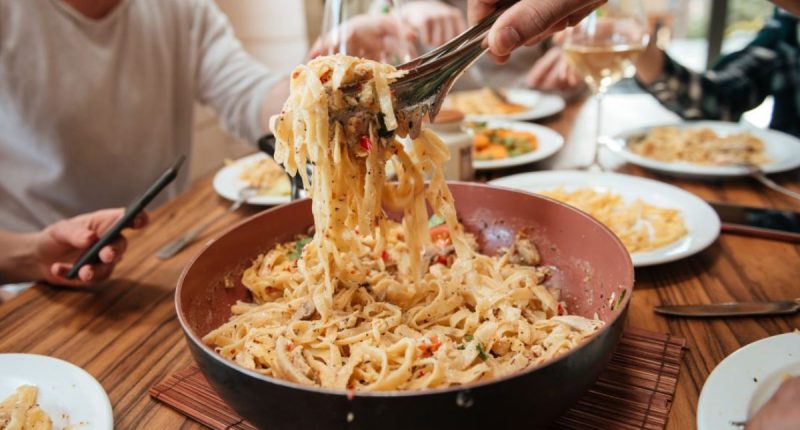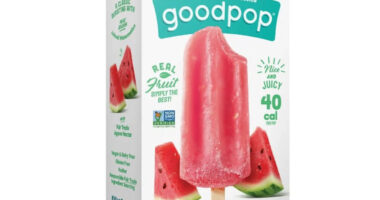Eating Habits That Are Wrecking Your Body After 50, Say Dietitians – There are probably plenty of habits you partake in on a daily basis, but the tricky part about habits is that they become such a normal part of your routine that you usually don’t even notice you are doing them. And while some habits are great for your health, like going for a morning walk or incorporating veggies into a home cooked breakfast, some habits can totally wreck your body—such as not sleeping enough, not getting enough fiber, or skipping meals. Not to mention the fact that the older you get, the longer the “not so great” habits continue, making them even harder to change. And unfortunately, there are some eating habits that are particularly bad for those in their 50s and beyond.
The reason that some habits can be worse as you enter your 50s and continue aging is mainly due to how your body undergoes changes. For instance, according to Medline Plus via the National Library of Medicine, you may start to lose lean tissue, your muscles may lose some cells, and your bones can become less dense—all of which can happen as early as your 30s! Not only that, but as you age, your weight may naturally begin to shift, and for many people, body fat can more easily increase. Medline recommends that along with getting regular exercise and limiting your consumption of alcohol, making sure to eat a healthy, well-balanced diet can help you slow the aging process.
So, if you’re 50 years young, or somewhere close to it, what does a healthy diet include and what are some of the eating habits experts warn can have lasting consequences for your health as you age? Here are some common habits you may want to think about changing, and for more healthy aging tips, make sure to check out The 20 Worst Foods for Men Over 40.
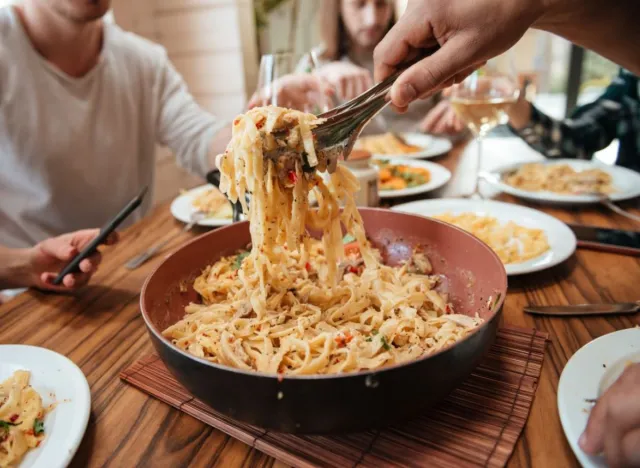
According to Lisa Young, PhD, RDN, author of Finally Full, Finally Slim and member of our Medical Expert Board, your portion sizes matter as you age. “People over 50 are already susceptible to gaining weight more easily because you lose lean body mass as you age, which slows your metabolism down,” says Young. “It is important to watch your portion sizes, because large portions contain more calories than small ones and can encourage overeating.”
Research backs this up with multiple findings confirming that large portions can lead to weight gain. According to the British Nutrition Foundation, larger meals equal more energy intake, which ultimately leads to taking in too many calories. Another study, published in Advances in Nutrition, confirmed that portion size is a significant issue leading to more cases of weight gain and obesity.

Getting into the habit of skipping meals can easily go unnoticed, especially if you’re running late or are extremely busy. However, this habit can unfortunately be harmful to your health as you age.
“Skipping meals (especially breakfast) can contribute to increased insulin resistance because going long periods of time without eating, then eating large amounts all at once, can contribute to bigger swings in blood sugar levels throughout the day,” says Stephanie Hnatiuk RD, CDE, PTS. “Individuals who skip breakfast and/or lunch are more likely to consume excess calories in the late afternoon and evening, which can also contribute to weight gain.”
Hnatiuk instead suggests eating three full meals a day when you can. If you know you’re going to have a busy day, it can be helpful to prepare something ahead of time so you can grab it and take it on the go.
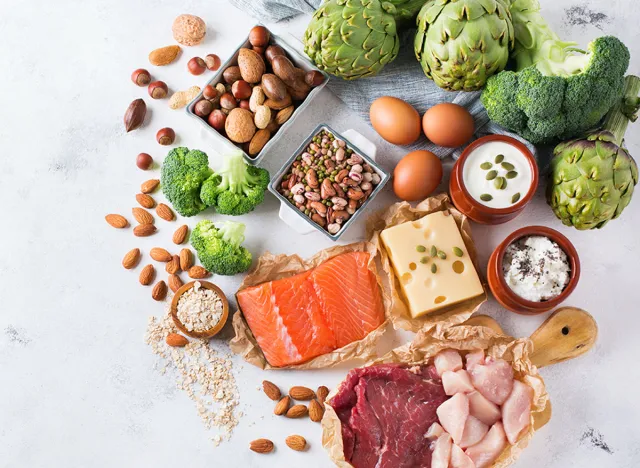
Getting enough protein in your diet is important for every person at any age, but it is an especially important eating habit for those in their 50s. “Protein is key for maintaining muscle mass, which you need for healthy aging,” says Hnatiuk. “Because a decrease in muscle mass occurs with age, protein requirements increase as we get older.” In fact, according to the Journal of the American College of Nutrition, your body’s protein tissue decreases an entire 10% by the time you reach 70.
Due to this increase in requirements, Hnatiuk suggests including a source of protein at every meal, “like eggs, Greek yogurt, fish, poultry, tofu, or beans.”
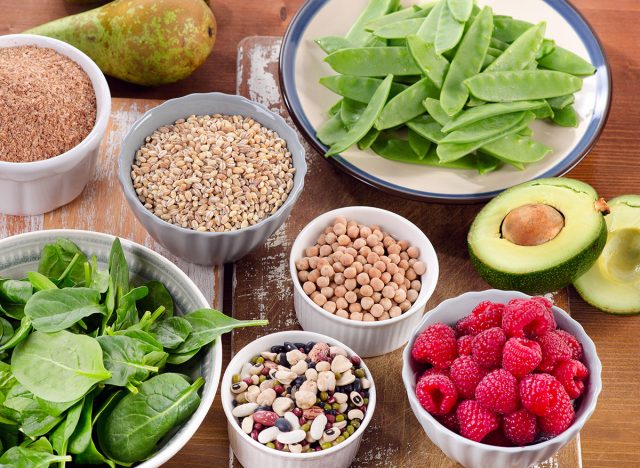
Along with protein, fiber is another crucial nutrient in maintaining a healthy diet into your 50s. According to Hnatiuk, “Fiber plays a role in the health of our digestive system, improves fullness after meals, and helps to reduce spikes in blood sugars after we eat.”
Not only that, but many different research studies have found that eating enough fiber plays an enormously significant role in living a longer life. One study published in the Journal of Gerontology discovered that out of all the factors studied—total carbohydrate intake, sugar intake, and fiber intake—total fiber had the greatest effect on “successful aging.” Another study, which was published in Frontiers in Nutrition, found that dietary fiber may also help lower inflammation that leads to brain aging, therefore helping contribute to better cognitive health as you age.
However, despite fiber being such a necessary part of healthy living, many people aren’t getting nearly enough on a daily basis. “To meet your fiber goal and get the benefits of fiber in your diet, make a habit of including fruits and or vegetables with every meal, and choose whole grains over white or refined grains as often as you can,” says Hnatiuk. This is because when a whole grain is processed to make it white (for example, white bread), the fiber is often mostly or completely removed in the process.
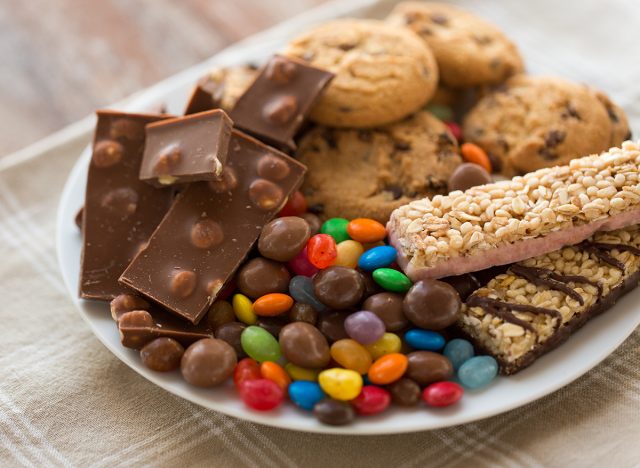
It’s important to pay attention to inflammation as you get older because it can lead to a number of different diseases if it turns chronic—many of which are associated with aging. According to a report published in Nature Medicine, these inflammatory diseases include kidney disease, non-alcoholic fatty liver disease, cardiovascular disease, diabetes, and cancer.
As we mentioned above, eating foods higher in fiber can help reduce inflammation in the body, but along with more fiber, limiting your consumption of pro-inflammatory foods is a helpful eating habit to have after 50. Some specific inflammatory items that you may want to limit as you age include sodas and sugary drinks, processed baked goods like cookies and cakes, refined carbohydrates like white bread, and processed meats.
Don’t miss | Why Eat Gluten-Free Fast Food? Best Food Options at 10 Chains
A previous version of this story was published on December 4, 2021. It has been updated to include additional copy and proofreading revisions, additional research, and updated contextual links.
Source
